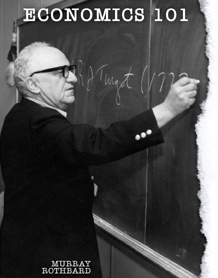My first Fundamentals of Microeconomics starts on Tuesday next week, and I think the best preparation for incoming freshman may be to read this article:
Classroom Etiquette 101
It basically points out classroom etiquette that most instructors notice, but students never come out and say. The best part of this article is that it's written by a student to other students. If you're a college student, please take the time to read this and think about your actions.
It will be interesting to see how the things I've learned from teaching Sports Economics translates into a principles course.
Focused on exposing the underlying economics behind humans' favorite activities. Why sports teams shouldn't be punting on fourth down and why Walmart dumps their Halloween candy the day after Halloween. Our lives are surrounded by economics, but most people don't take the time to stop and think about what's going on. This site is aimed at pointing out economics where you may have never seen it before.
Tuesday, August 14, 2012
Classes Start Soon
Labels:
OpEd. classroom etiquette,
students,
Teaching
Thursday, August 2, 2012
Econ of Sports: Course Evaluations
I taught Sports Economics during the first summer session at Washington State University, and I finally got the comments back from the course evaluations. Overall, I was very happy with how the class ended, so I was really looking forward to the evaluations. Here are some of the comments from the report:
"He was excellent in offering whatever the students needed help or questions about. Always in a good mood and ready [sic] does love teaching this course, it shows in his performance."
"Jadrian was able to explain simple econ concepts in a way that is understandable. This course is a great supplement to econ majors."
"His interaction with the students and wanting them to learn and ask questions. He knew his stuff so if we did have questions he would break it down to make it easier to understand."
"He was excellent in offering whatever the students needed help or questions about. Always in a good mood and ready [sic] does love teaching this course, it shows in his performance."
"Jadrian was able to explain simple econ concepts in a way that is understandable. This course is a great supplement to econ majors."
"His interaction with the students and wanting them to learn and ask questions. He knew his stuff so if we did have questions he would break it down to make it easier to understand."
Wednesday, August 1, 2012
Olympic Medalists & Their Tax Bill
Little known fact, it turns out that Olympiads returning with a medal will finish the year with an extra bump in their tax burden. Why you might ask? Well, along with the medal, the IOC also awards honorariums depending on how an athlete finishes. According to one source, the prize for a bronze medal will give the Olympiad a $10,000 bonus, but the government will take its share of 35%.
Unfortunately, that would be true if the Olympiad was already at the highest tax bracket (such as the USA Men's Basketball Team), but for true amateurs participating in the sport (say, Judo?), they will unlikely be forced to pay the full tax rate. When I was a student on an assistantship, I had made a whopping $16,000 one year, with an effective tax rate of 2%. Needless to say, most Olympic athletes are not paying the full 35%.
But wait, there's a savior in this "mess." Florida senator Marco Rubio (R), who's really a Tea Party candidate disguised with an (R) after his name, has made remarks of having this tax removed from Olympiads' tax bill. While it sounds all fair and well, it's highly illogical, and purely political. For the true amateurs, they aren't paying the full burden, and most likely have other jobs and/or sponsorships to help cover this costs. For the professional athletes at the Olympics (cough, Lebron James), they need less reasons to pay taxes. For those who complain about the tax code being too complicated (which Rubio also admits), this is just one more article in that hefty 73,608 book.
Unfortunately, that would be true if the Olympiad was already at the highest tax bracket (such as the USA Men's Basketball Team), but for true amateurs participating in the sport (say, Judo?), they will unlikely be forced to pay the full tax rate. When I was a student on an assistantship, I had made a whopping $16,000 one year, with an effective tax rate of 2%. Needless to say, most Olympic athletes are not paying the full 35%.
But wait, there's a savior in this "mess." Florida senator Marco Rubio (R), who's really a Tea Party candidate disguised with an (R) after his name, has made remarks of having this tax removed from Olympiads' tax bill. While it sounds all fair and well, it's highly illogical, and purely political. For the true amateurs, they aren't paying the full burden, and most likely have other jobs and/or sponsorships to help cover this costs. For the professional athletes at the Olympics (cough, Lebron James), they need less reasons to pay taxes. For those who complain about the tax code being too complicated (which Rubio also admits), this is just one more article in that hefty 73,608 book.
Subscribe to:
Comments (Atom)
